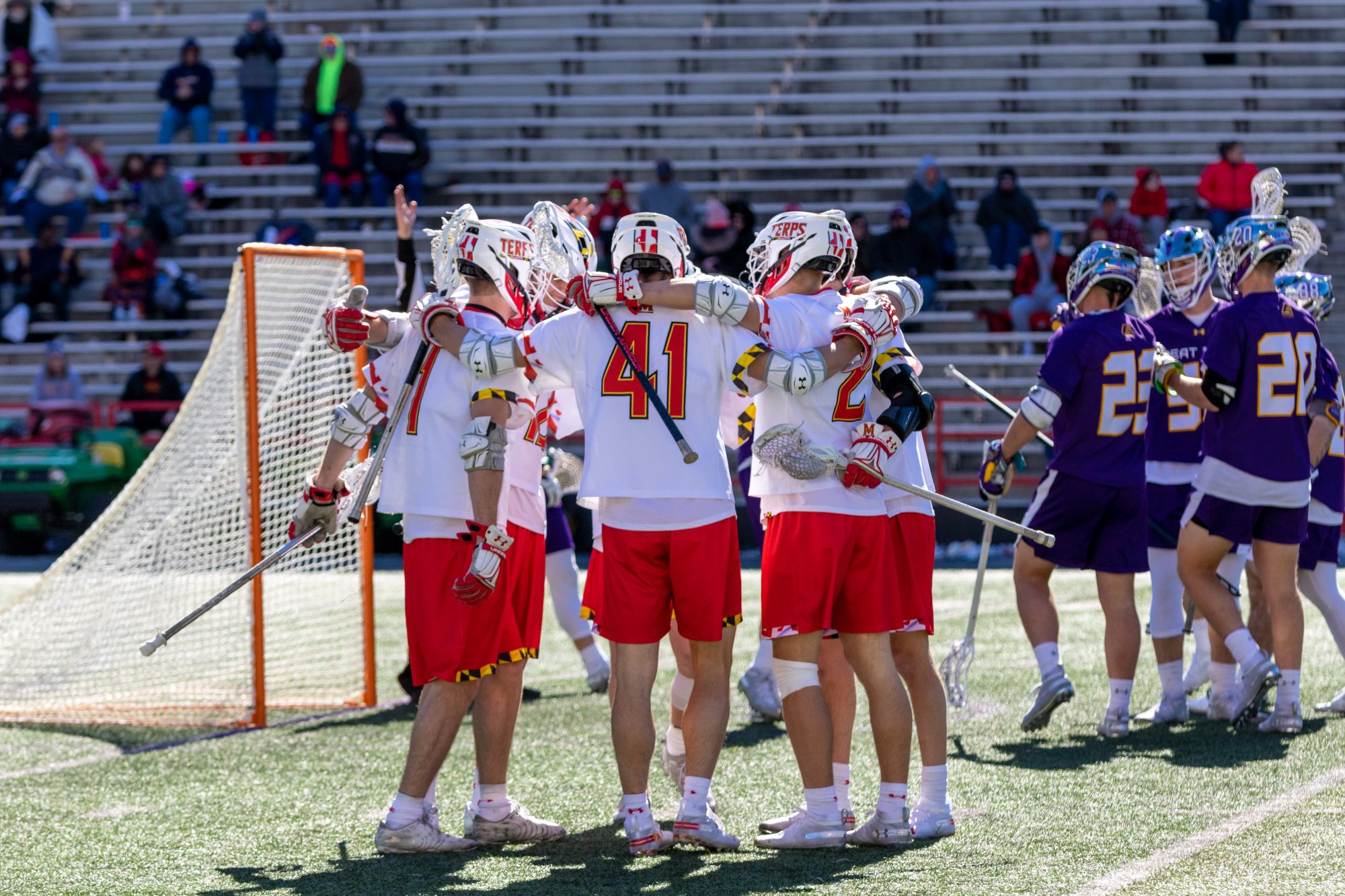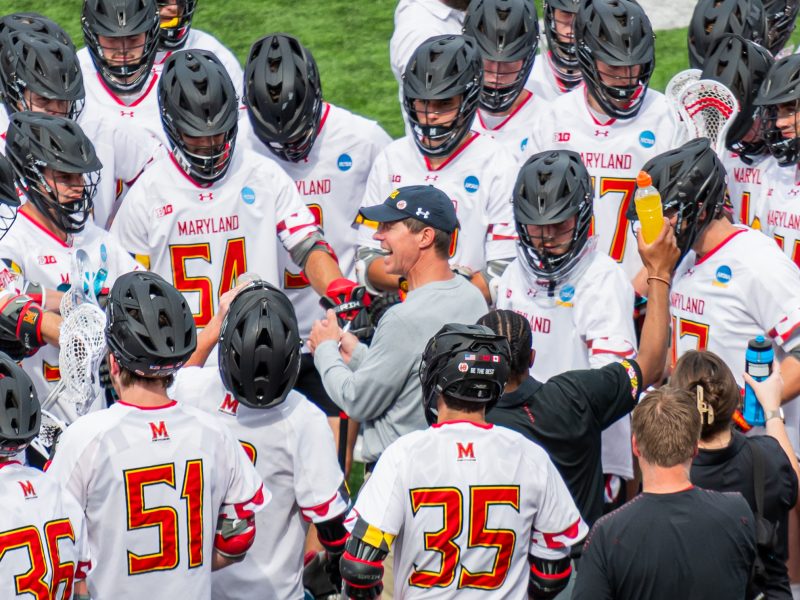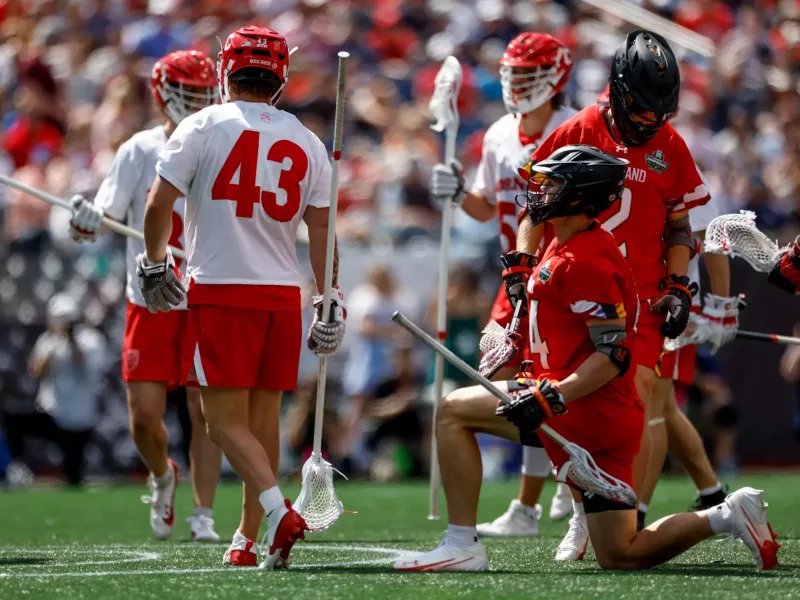Wind swirled across Capital One Field on Saturday, the perfect blend of blustery breezes and sunlight that often gives Maryland men’s lacrosse’s players license to unleash their lush locks — if only for a fleeting moment.
Yet as the Terps uncaged their heads for the national anthem, those lengthy manes were no more, replaced by close shaves that spanned up and down the Maryland sideline.
Midfielder Bubba Fairman led Maryland’s charge to baldness in the days prior, part of “Lacrosse for Life,” a nationwide campaign that donates $1,000 to cancer research at Boston Children’s Hospital for each player who shaves his or her head by March 1. The Terps, one of 91 collegiate lacrosse programs that took part, would earn $48,000 for the cause.
It’s a cause that has touched coach John Tillman’s squad, affecting players and coaches alike. And, as Saturday’s display showed, it’s a cause Maryland is passionate about.
“Hair’s irrelevant in the long scheme of things,” midfielder Roman Puglise said. “If we’re healthy and happy and able to play lacrosse every day and some kids aren’t, you try to help them get to the same position that you have.”
[Read more: Logan Wisnauskas, Justin Shockey take home Big Ten weekly honors for Maryland lacrosse]
Brown’s Tommy Hale, co-founder of “Lacrosse for Life,” reached out to Fairman — his old teammate at Deerfield Academy.
Initially, there were reservations — many a Terp takes pride in their flowing coiffures.
“At first, when the idea was first brought up, everyone was kinda nervous about it,” midfielder Russell Masci said.
The real winners today ➡️ @BostonChildrens
Feels great to do our part for #LacrosseForLife, raising $48,000 for cancer research! #BeTheBest pic.twitter.com/7StB9oj48q
— Maryland Lacrosse (@TerpsMLax) March 7, 2020
But by Sunday, March 1, Tillman’s squad was in.
It was a light-hearted affair, Puglise said — Anthony DeMaio and Dean Draughn’s moms helped cut hair while the Terps laughed, joked and watched college basketball and lacrosse.
There were plenty of lively moments, too. Defender Noah Cash’s shave drew interest from his teammates; he’s been growing his hair out since he arrived in College Park.
“He’s this big, goofy guy, so I think a lot of guys got some enjoyment out of him getting his haircut,” attackman Jared Bernhardt said.
[Read more: Kyle Brickerd’s scout team work paid off for Maryland lacrosse against Albany]
And Masci’s new look was a shock, particularly to his professors.
“Going into class every day for that week was pretty interesting,” Masci said. “All the teachers noticed, so it was pretty fun.”
And as the remnants of Maryland’s manes cascaded to the floor, a sense of unity burgeoned within the squad — one rooted in its collective experiences with cancer.
“It’s a big team bonding experience on Sunday, we all show up at a house and get our heads shaved,” Masci said. “I think, in the bigger picture, it’s really great we were able to do it as a team.”
There’s Tillman, who proudly sported “RubiStrong” on his hat at times last campaign. The motto was a reference to Josh Rubinstein, a young fan who battled acute myeloid leukemia. Rubinstein went into remission just before his bone marrow transplant in November 2017, said his father, Jon Rubinstein, last April.
And for Bernhardt — whose father, Jim, passed away from cancer over the summer — Sunday’s outing was all the more poignant, a reminder of just how thoughtful and caring his teammates can be.
“Everyone loves their luscious hair,” Bernhardt said. “But to see guys put that aside and do that for a good cause, it means a lot.”
It did mean a lot, not only to Tillman’s squad or “Lacrosse for Life,” but for the countless young cancer patients who look up to Bernhardt and attackman Logan Wisnauskas.
Indeed, when the Terps stood on the sideline on Saturday, sunlight beaming onto their shaved domes, it was an unusual sight.
But for all that Maryland lost in hair length, it’s what it gained that sticks out in the minds of its players.
“It’s a cool way to give back, in just a small sense,” Puglise said. “For the privileges we have as Division I athletes and the talent, the health, the benefits that we’re allotted with.”



